Have you ever been unsure about the freshness of eggs when adding them to your recipes? Eggs can be tricky to judge because their shells hide the condition of the white and yolk. But don’t worry, we have some easy ways for you to determine if an egg is fresh and we’ll also share some insights on reducing food waste related to eggs.
When you buy eggs from the supermarket, they always have a recommended use-by date on the packaging. Did you know that in France, eggs cannot be sold 7 days before the minimum durability date stated on the package? If you buy eggs directly from a henhouse, the use-by date is not indicated, but you should know that it is a maximum of 28 days after the day of laying.
Don’t worry if the shells are not cracked or broken, you can store eggs in the refrigerator for up to one month past the recommended use-by date, which is 58 days after they were laid. Proper storage helps maintain freshness, prevents mold, and helps fight against food waste. Remember to keep your eggs refrigerated to avoid health risks.

Just like any other fresh product, eggs can develop a strange smell if they have expired. If you notice that an egg is past its expiration date and you want to keep it for later consumption, start by giving it a sniff. Expired eggs often have an unpleasant odor and should not be eaten as they may have lost their vitamins and have an altered taste. If the smell seems normal to you, go ahead and quickly consume the egg by making an omelette, for example.
Your eyes can also help you identify whether an egg is expired or still edible. Take a good look at the shell to avoid any risks. If the shell appears powdery, sticky, cracked, or in any questionable condition, it may indicate the presence of mold. Additionally, if you crack the egg into a bowl and notice any strange discoloration such as blue, pink, black, or green colors in the egg white or yolk.
